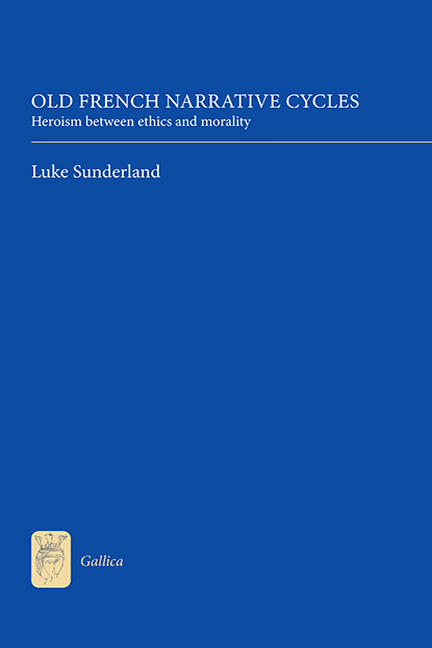Book contents
- Frontmatter
- Contents
- Dedication
- Acknowledgments
- Manuscripts of the Cycle de Guillaume
- Manuscripts of the Roman de Renart
- References and Abbreviations
- Introduction
- 1 Duty to the Geste: The Cycle de Guillaume d'Orange
- 2 Metaphor, Metonymy and Morality: The Vulgate Cycle
- 3 Responsibility to Reputation: The Prose Tristan
- 4 Ethical Evil: The Roman de Renart
- Conclusion
- Bibliography
- Index
- Miscellaneous EndMatter
2 - Metaphor, Metonymy and Morality: The Vulgate Cycle
Published online by Cambridge University Press: 09 May 2017
- Frontmatter
- Contents
- Dedication
- Acknowledgments
- Manuscripts of the Cycle de Guillaume
- Manuscripts of the Roman de Renart
- References and Abbreviations
- Introduction
- 1 Duty to the Geste: The Cycle de Guillaume d'Orange
- 2 Metaphor, Metonymy and Morality: The Vulgate Cycle
- 3 Responsibility to Reputation: The Prose Tristan
- 4 Ethical Evil: The Roman de Renart
- Conclusion
- Bibliography
- Index
- Miscellaneous EndMatter
Summary
The success of Lancelot, medieval French literature's most famous knight, can be measured bibliographically. Hero of Chrétien de Troyes's popular twelfth-century verse romance Le Chevalier de la Charrette, Lancelot's narrative was expanded in the thirteenth century to produce over 170 prose romance manuscripts, making it a medieval blockbuster. There are many different incarnations of the material, however, and many fragmentary and incomplete codices. To cite just the best-known versions: the ‘non-cyclic’ Lancelot is a relatively short romance telling of the hero's childhood and his great deeds as a young knight. A much larger ensemble, often called the Lancelot-Grail Cycle, contains a longer, cyclic version of the Lancelot in which Lancelot is precariously established as the best knight in the world, only to then disappoint by failing at the ultimate challenge, the Grail quest, because of his adulterous sin with Guinevere. This precedes two other texts: La Queste del Saint Graal, which narrates the accomplishment of the Grail quest by Lancelot's perfect son, Galahad, and La Mort le Roi Artu, which gives us an account of the wars that tear apart the Arthurian world. Finally, the largest version of the cycle is the Vulgate, which also includes three prologue texts to the Lancelot: L'Estoire del Saint Graal, the Merlin and Les Premiers Faits du roi Arthur (sometimes called the Vulgate Suite de Merlin), which together account for the origins of the Grail, its arrival in Britain and the Christianization of that country as well as Merlin's birth and the marvels he performs as a youthful Arthur establishes his kingdom.
The bulk of this chapter is a reading of the Vulgate Cycle, although I will return at the end to survey some of the possibilities offered by other constellations of the material. A complete history of the Arthurian world and of the Grail, the Vulgate is a vast textual ensemble in which Lancelot's narrative becomes a long distraction as we wait for Galahad whose arrival is prophesied right at the start. The Vulgate offers the enticing prospect of knowledge about the Grail, but then delays disclosure in order to push its readers through long sequences of quests, adventures and battles. The Grail, I argue, is an object of desire promising absolute fulfilment, and thus supporting the fantasy that fracture, lack and strife can be overcome.
- Type
- Chapter
- Information
- Old French Narrative CyclesHeroism between Ethics and Morality, pp. 63 - 100Publisher: Boydell & BrewerPrint publication year: 2010



